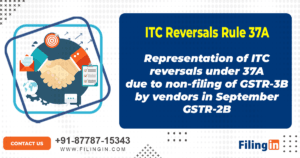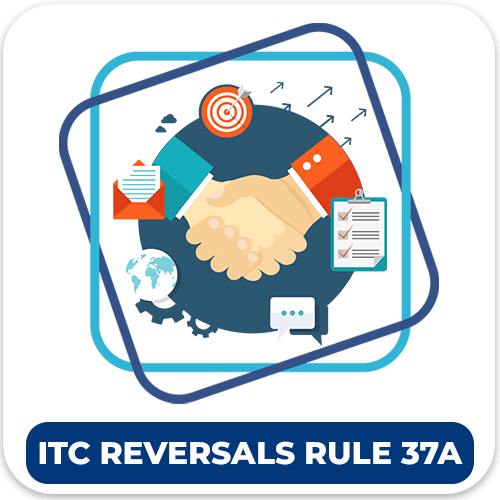As we move through FY 2023-24, taxpayers are beginning to see important updates reflected in their tax filings. One key issue arising in the September GSTR-2B is the requirement for Input Tax Credit (ITC) reversals under Rule 37A. This has become a crucial point for businesses due to the non-filing of GSTR-3B by suppliers. What does this mean for you? Let’s dive into the details of ITC reversals and how businesses can manage this effectively.

Understanding Rule 37A and Its Implications
What is Rule 37A?
Rule 37A was introduced via Notification No. 12/2024 – Central Tax, issued on July 10, 2024. This rule is intended to ensure that if a supplier fails to file their GSTR-3B returns by September 30 following the end of the financial year, the recipient must reverse the ITC claimed for that supplier’s invoices. The reversal is necessary in the November GSTR-3B filing, and if it is not done, interest under Section 50 may begin accruing.
Simply put, businesses must stay on top of their suppliers’ GSTR-3B filings to avoid complications.
Why ITC Reversals Are Appearing in September GSTR-2B
September GSTR-2B is displaying ITC amounts that are subject to reversal because vendors have failed to file their GSTR-3B returns for FY 2023-24. This means that businesses need to act quickly to ensure compliance by the time they file their October GSTR-3B.
Impact of Vendor Non-Compliance
If your vendors have not filed their GSTR-3B returns, the ITC you have claimed on their invoices may need to be reversed temporarily. This can cause cash flow disruptions, as you will lose the credit until the vendor files their return. The longer the delay, the more challenging it becomes to manage your tax obligations efficiently.
Key Steps for Taxpayers to Handle ITC Reversals
Now that we understand the issue, how can you address it? Here are some critical steps to manage ITC reversals under Rule 37A:
1. Review Your GSTR-2B for September
Start by carefully reviewing your September GSTR-2B statement. This statement will show you the ITC amounts that are subject to reversal due to your vendors’ non-filing of GSTR-3B returns. This is the first step in understanding the scope of the problem and preparing for necessary actions.
2. Follow Up with Vendors
Once you’ve identified the vendors who haven’t filed their GSTR-3B, it’s time to follow up with them. Send reminders and request them to file their pending GSTR-3B for FY 2023-24 as soon as possible. By doing so, you can avoid the need for ITC reversal when filing your October GSTR-3B.
3. ITC Reversal If Vendors Fail to File
If your vendors do not file their GSTR-3B by the time you need to file your October GSTR-3B, you must temporarily reverse the ITC. This reversal should be disclosed in Table 4B(2) of your GSTR-3B return. It’s essential to stay compliant with this requirement to avoid penalties and interest accrual under Section 50.
4. Reclaim ITC Upon Vendor Filing
The good news is that once your suppliers file their GSTR-3B, you can reclaim the ITC. This will allow you to adjust your GSTR-3B filings for the following month and restore the credit that was temporarily lost.
ITC Reversal Calculation Under Rule 37A
What Invoices Are Affected?
The reversal amount under Rule 37A includes all invoices for which the supplier has not filed GSTR-3B. This excludes Reverse Charge Mechanism (RCM) invoices, debit notes, and any amendments to these documents. However, credit notes and their amendments are also excluded from the ITC reversal calculation.
The Formula for ITC Reversal
While there is no fixed formula, the amount to be reversed corresponds to the total ITC claimed on the supplier’s invoices during the period in question. Once the vendor files their GSTR-3B, this amount can be reinstated.
Consequences of Non-Reversal and Delayed Vendor Filing
What Happens If You Don’t Reverse ITC?
Failing to reverse the ITC when required can lead to interest accrual under Section 50 of the GST Act. This interest will continue to accumulate until the ITC is reversed or the vendor files their GSTR-3B.
Dealing with Interest Accrual
In cases where ITC reversal is delayed, you may face additional financial burdens due to interest charges. This makes it even more important to monitor vendor compliance and take proactive steps to resolve the issue as quickly as possible.
Managing Vendor Relationships to Avoid ITC Reversals
Communicate Regularly with Vendors
To avoid the hassle of ITC reversals, maintaining clear and regular communication with your vendors is crucial. Keep them informed of their filing deadlines and the impact their non-compliance has on your business.
Leverage Contractual Agreements
Consider incorporating clauses in your vendor contracts that require timely filing of GSTR-3B. This can serve as a safeguard to ensure compliance and reduce the chances of ITC reversal.
Conclusion
As the September GSTR-2B displays ITC reversals due to vendor non-filing of GSTR-3B, it’s essential for businesses to stay proactive. Rule 37A makes it mandatory to reverse ITC if suppliers fail to file their returns on time, with the option to reclaim the credit once the filing is complete. By keeping a close eye on your GSTR-2B, maintaining vendor communication, and understanding the steps for ITC reversal and reclamation, you can navigate this process with minimal disruption to your business.
Staying compliant not only helps avoid interest and penalties but also ensures smoother tax management in the long run.
FAQs
- What is Rule 37A and why is it important?
Rule 37A mandates that businesses must reverse ITC if suppliers fail to file GSTR-3B by September 30 following the financial year. It ensures compliance and timely vendor filing. - How can businesses avoid ITC reversals?
Businesses can avoid ITC reversals by actively following up with vendors to ensure they file their GSTR-3B on time and monitoring their GSTR-2B statements. - What happens if I don’t reverse ITC under Rule 37A?
If ITC is not reversed when required, interest under Section 50 will start accruing, leading to financial penalties until compliance is restored. - Can I reclaim ITC after reversing it?
Yes, once the supplier files their GSTR-3B, the previously reversed ITC can be reclaimed and adjusted in your future GSTR-3B filings. - What invoices are affected by Rule 37A?
Rule 37A affects all invoices for which GSTR-3B has not been filed by the supplier, excluding RCM invoices, debit notes, and their amendments.

